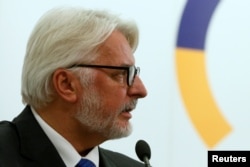Poland faces the possibility of losing its voting rights in the European Union over issues related to democracy and the rule of law. The EU is trying to determine whether to apply Article 7 — a measure intended to punish countries seen as violating fundamental rights.
In its 60-year history, the European Union has never had to trigger Article 7.
When the regional grouping gave Poland until the end of February to implement several reforms to its judicial independence and democratic institutions, it seemed that Article 7 might be the next step if the EU determined that Poland was not putting enough reforms in place. Even though the deadline passed this week, it is not clear what steps the commission can take next.
Much has changed in Poland since the 2015 win of the conservative right wing PiS, Law and Justice Party. The party blocked the initial picks for the Polish constitutional court and presented its own candidates. That was followed by a crackdown on media outlets and journalists, mass demonstrations against proposed extremely conservative laws and political appointments on all levels. That led the European Commission to warn Poland.
Situation described at 'dramatic'
Katarzyna Morton is an active member of KOD, the Polish Committee for the Defense of Democracy. She describes the situation under the current government as “dramatic” and fears the country is heading toward becoming a modern authoritarian state. Morton says she hopes the EU keeps following up on current Polish developments, adding the tone of the EU will matter.
“The EU really has to work on the way they say things to be sure that some Polish people who are in favor of the government or just perhaps do not understand EU so well, won't take it as a threat but will understand that the EU is working in their favor and wants them to succeed in their citizenship.”
Triggering Article 7 could lead to another crisis within the EU while the bloc is already dealing with growing anti-EU sentiment, along with Brexit — Britain's decision to leave the EU — and an ongoing migrant crisis.
Little room to maneuver
Agata Gostynska-Jakubowska of the Center for European Reform says the European Commission has little room to maneuver and might lose this battle with Poland.
“If the commission does not respond, it would face criticism from liberals in the European Parliament and it looks weak in the eyes of external actors; but, by interfering in this political conflict, the risks of antagonizing the Polish public is the last thing the commission would like to have because of growing euroscepticism.”
Gostynska-Jakubowska also points out that it's questionable whether the commission has sufficient democratic legitimacy to push through something so politically sensitive as Article 7.
Poland feels it has complied
The request for reforms was made after previous recommendations were sent to Warsaw, but no real progress was recorded.
Poland feels its parliament has adopted enough reforms that “comply with European standards regarding the functioning of constitutional courts” and says there is no systematic threat to the rule of law in Poland. Activists such as Morton disagree, saying she does not notice any reforms being implemented.
Polish Foreign Minister Witold Waszczykowski told local media earlier this week that he expects “the matter will be closed.”
Waszczykowski had a public exchange of words during a conference in Germany last week with EU Commission Vice President Frans Timmermans on Polish constitutional reforms. The Polish Ministry of Foreign Affairs released a statement earlier this week accusing Timmermans' actions and words of being politically motivated.
Unanimous vote triggers Article 7
While the commission searches for a way forward, diplomatic tensions between Warsaw and Brussels remained unresolved as the Polish Ministry of Foreign Affairs summoned the head of the European Commission's representation to Poland on Thursday over language used by an EU document that Poland called unacceptable.
The commission is to discuss the matter with member states on what steps to take on the Polish issue.
Gostynska-Jakubowska says shifting the responsibility to member states will not solve the issue: “There won't be political will among member states to take further action. EU treaties are pretty clear about this; it is the decision of member states on whether to activate Article 7 or not.”
Triggering Article 7 needs unanimity among all member states, and Hungary has already said it would veto any such a decision. The current president of the European Council, Donald Tusk, happens to be a former Polish president.
The next meeting of EU leaders is to take place after the first week of March in Brussels. The issue with Poland is expected to be discussed, but it's unlikely the process for triggering Article 7 will start.












